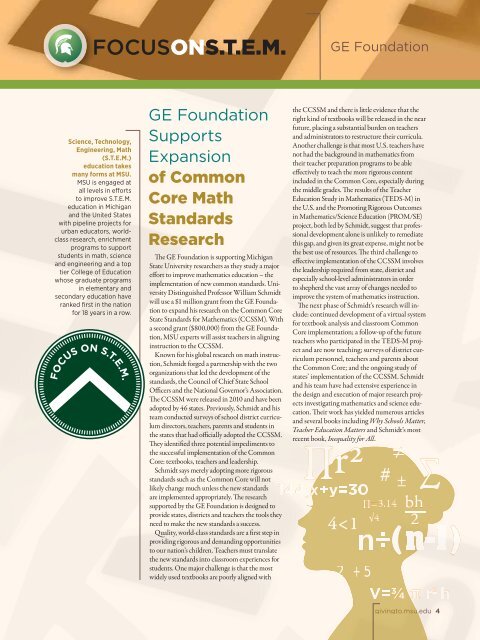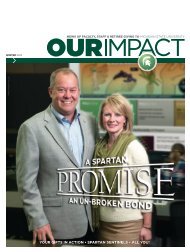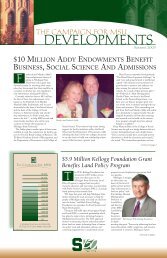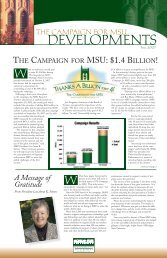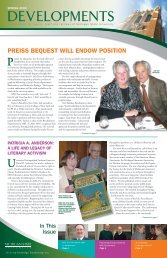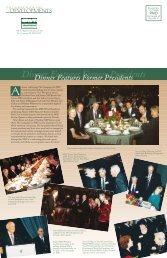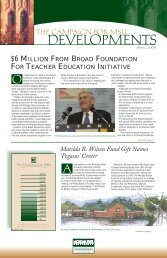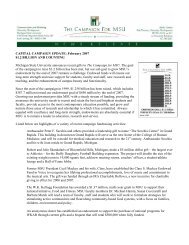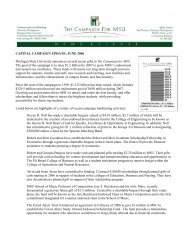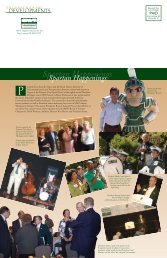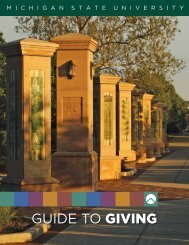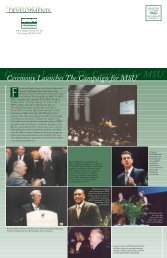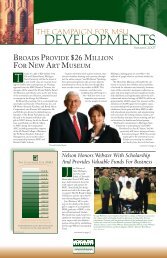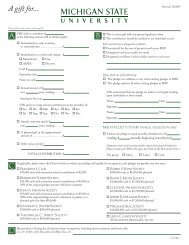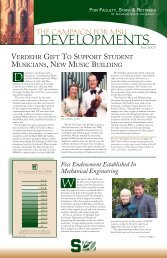Winter 2013 - Giving to MSU - Michigan State University
Winter 2013 - Giving to MSU - Michigan State University
Winter 2013 - Giving to MSU - Michigan State University
Create successful ePaper yourself
Turn your PDF publications into a flip-book with our unique Google optimized e-Paper software.
FOCUSONS.T.E.M.<br />
GE Foundation<br />
Science, Technology,<br />
Engineering, Math<br />
(S.T.E.M.)<br />
education takes<br />
many forms at <strong>MSU</strong>.<br />
<strong>MSU</strong> is engaged at<br />
all levels in efforts<br />
<strong>to</strong> improve S.T.E.M.<br />
education in <strong>Michigan</strong><br />
and the United <strong>State</strong>s<br />
with pipeline projects for<br />
urban educa<strong>to</strong>rs, worldclass<br />
research, enrichment<br />
programs <strong>to</strong> support<br />
students in math, science<br />
and engineering and a <strong>to</strong>p<br />
tier College of Education<br />
whose graduate programs<br />
in elementary and<br />
secondary education have<br />
ranked first in the nation<br />
for 18 years in a row.<br />
GE Foundation<br />
Supports<br />
Expansion<br />
of Common<br />
Core Math<br />
Standards<br />
Research<br />
The GE Foundation is supporting <strong>Michigan</strong><br />
<strong>State</strong> <strong>University</strong> researchers as they study a major<br />
effort <strong>to</strong> improve mathematics education – the<br />
implementation of new common standards. <strong>University</strong><br />
Distinguished Professor William Schmidt<br />
will use a $1 million grant from the GE Foundation<br />
<strong>to</strong> expand his research on the Common Core<br />
<strong>State</strong> Standards for Mathematics (CCSSM). With<br />
a second grant ($800,000) from the GE Foundation,<br />
<strong>MSU</strong> experts will assist teachers in aligning<br />
instruction <strong>to</strong> the CCSSM.<br />
Known for his global research on math instruction,<br />
Schmidt forged a partnership with the two<br />
organizations that led the development of the<br />
standards, the Council of Chief <strong>State</strong> School<br />
Officers and the National Governor’s Association.<br />
The CCSSM were released in 2010 and have been<br />
adopted by 46 states. Previously, Schmidt and his<br />
team conducted surveys of school district curriculum<br />
direc<strong>to</strong>rs, teachers, parents and students in<br />
the states that had officially adopted the CCSSM.<br />
They identified three potential impediments <strong>to</strong><br />
the successful implementation of the Common<br />
Core: textbooks, teachers and leadership.<br />
Schmidt says merely adopting more rigorous<br />
standards such as the Common Core will not<br />
likely change much unless the new standards<br />
are implemented appropriately. The research<br />
supported by the GE Foundation is designed <strong>to</strong><br />
provide states, districts and teachers the <strong>to</strong>ols they<br />
need <strong>to</strong> make the new standards a success.<br />
Quality, world-class standards are a first step in<br />
providing rigorous and demanding opportunities<br />
<strong>to</strong> our nation’s children. Teachers must translate<br />
the new standards in<strong>to</strong> classroom experiences for<br />
students. One major challenge is that the most<br />
widely used textbooks are poorly aligned with<br />
the CCSSM and there is little evidence that the<br />
right kind of textbooks will be released in the near<br />
future, placing a substantial burden on teachers<br />
and administra<strong>to</strong>rs <strong>to</strong> restructure their curricula.<br />
Another challenge is that most U.S. teachers have<br />
not had the background in mathematics from<br />
their teacher preparation programs <strong>to</strong> be able<br />
effectively <strong>to</strong> teach the more rigorous content<br />
included in the Common Core, especially during<br />
the middle grades. The results of the Teacher<br />
Education Study in Mathematics (TEDS-M) in<br />
the U.S. and the Promoting Rigorous Outcomes<br />
in Mathematics/Science Education (PROM/SE)<br />
project, both led by Schmidt, suggest that professional<br />
development alone is unlikely <strong>to</strong> remediate<br />
this gap, and given its great expense, might not be<br />
the best use of resources. The third challenge <strong>to</strong><br />
effective implementation of the CCSSM involves<br />
the leadership required from state, district and<br />
especially school-level administra<strong>to</strong>rs in order<br />
<strong>to</strong> shepherd the vast array of changes needed <strong>to</strong><br />
improve the system of mathematics instruction.<br />
The next phase of Schmidt’s research will include:<br />
continued development of a virtual system<br />
for textbook analysis and classroom Common<br />
Core implementation; a follow-up of the future<br />
teachers who participated in the TEDS-M project<br />
and are now teaching; surveys of district curriculum<br />
personnel, teachers and parents about<br />
the Common Core; and the ongoing study of<br />
states’ implementation of the CCSSM. Schmidt<br />
and his team have had extensive experience in<br />
the design and execution of major research projects<br />
investigating mathematics and science education.<br />
Their work has yielded numerous articles<br />
and several books including Why Schools Matter,<br />
Teacher Education Matters and Schmidt’s most<br />
recent book, Inequality for All.<br />
4


